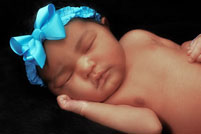Maine Newborn Bloodspot Screening Program


NBSP Mission
To eliminate or reduce mortality, morbidity and disabilities by screening, detection and treatment of the disorders included in the Maine newborn screening panel.
For information please contact:
- Newborn Screening Bloodspot Program
- Tel: (207) 287-5357
- TTY: Maine Relay 711
- Fax: (207) 287-4743
Announcement
The Maine CDC Newborn Bloodspot Screening Program added four new conditions to our Newborn Screening Panel as of April 1, 2021.
- Pompe Disease (Pompe): Variable ages of onset and rates of progression. Symptoms include generalized muscle weakness, cardiac hypertrophy, respiratory issues, and failure to thrive. Treatment involves enzyme replacement therapy.
- X-Linked Adrenoleukodystrophy (X-ALD): Mainly affects the nervous system and adrenal cortex and has a broad clinical spectrum. It affects primarily males. Treatment involves symptom management, stem cell transplant, and gene therapies.
- Mucopolysaccharidosis Type I (MPS-1): Very rare inherited progressive multi-system disorder with a range of severity. Symptoms include developmental delay, recurrent urinary and respiratory infections, and organ and skeletal abnormalities. Treatment involves symptom management, enzyme replacement therapy, stem cell transplant, and gene therapies.
- Spinal Muscular Atrophy (SMA): Most common of these four conditions (1 in 11,000 births) involving the absence of a gene that produces a protein critical to the function of the nerves that control muscles. It is progressive and can be fatal. Treatment involves gene therapies.
Filter paper fees have increased to $220 each to cover the cost of adding these conditions. These changes are due to the legislative rule (PDF) change.
For more information, contact Anne Watson, Newborn Bloodspot Screening Coordinator at 207-287-8188 or anne.watson@maine.gov.
FAQ
Why does my baby need newborn screening tests?
By law, all newborns are tested for several rare but serious medical conditions. Babies with these conditions may look healthy at birth. If not treated, these conditions can cause health problems such as mental retardation, slow growth, and even death. With treatment, these problems may be prevented.
How will my baby be tested?
A nurse or other medical professional will take a few drops of blood from your baby’s heel. This blood sample is sent to a newborn screening laboratory.
When should the blood sample be taken?
The blood should be drawn after your baby is 24 hours old, but before your baby leaves the hospital.
How will I get the test results?
Your baby’s doctor will contact you if the results suggest that your baby may have one of these conditions. The doctor will talk with you about the results and what needs to be done next.
Ask about the test results when you see your baby’s doctor.
What if my baby needs to be retested?
Sometimes, a baby needs to be tested again. This does not necessarily mean that your baby has a medical condition. Retesting may need to be done if:
- The blood sample was taken before your baby was 24 hours old
- There was a problem with the way the blood sample was taken
- The first test showed a possible medical condition
Your baby’s doctor or the Maine Newborn Bloodspot Screening Program will contact you if your baby needs more testing. It is important to get this testing done right away.
What tests are done?
The tests that are done depend on the state you live in. Each state tests for a slightly different list of conditions. In general, the conditions that are tested for fall into one of the following groups:
- Metabolic conditions, which affect how the body processes food
- Endocrine conditions, which affect the levels of important hormones
- Hemoglobin conditions, which affect the blood and cause anemia, infections, and other health problems
- A pulmonary condition, which affects growth and the lungs
- An Immune condition, which affects how the body fights infections
See insert for a list of the conditions tested for in Maine. Newborn screening may find babies with conditions not on this list. Screening may also find a baby that carries only one gene for a condition. Most babies with one gene will not get sick from the condition.
Testing for more conditions may be available at other laboratories for a fee.
How are these conditions treated?
The treatment for each condition is different. Treatment may include a special diet, hormones, and/or medications.
If your baby has one of these conditions, it is very important to start the treatment as soon as possible.
What if I have more questions?
Ask your baby’s doctor or contact the Maine Newborn Bloodspot Screening Program. See our contact information on the back of this brochure.
Maine State Law - Relating to Newborn Bloodspot Screening
Preventing Handicapping Conditions; Detection of serious conditions
This law requires all newborns to be tested for several rare but serious medical conditions.
Rules and Regulations - Relating to Newborn Bloodspot Screening (Adopted Chapter 283). These rules discuss how the Newborn Bloodspot Program is implemented.
State of Maine Process for Adding Conditions to the Newborn Bloodspot Screening Panel – Adding Conditions to State Newborn Screening Panels describes the process Maine follows when adding newborn screening disorders to its newborn screening panel. This collaborative process relies on the expertise and experience of national and international newborn screening programs, genetics specialists, state health agencies, parents and families, health providers, state policy makers and other stakeholders. The state aims to select disorders that have the greatest potential to protect the health of Maine babies.
The Maine Newborn Bloodspot Screening provides information on some rare disorders of body chemistry. These screening tests may not pick up all newborns with these rare disorders. Even if the results of these screening tests are normal, there may be other medical problems that cannot be detected by these tests. It is important for your baby to have regular check-ups and good medical care. This blood test is only a screen.



